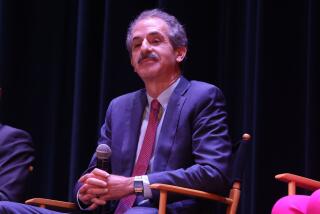U.S. Questions Meese’s Request for Legal Fee Payment
- Share via
WASHINGTON — The Justice Department, in a sealed filing with a special court, is questioning Atty. Gen.-designate Edwin Meese III’s request for reimbursement of $700,000 in legal fees that he incurred while under investigation by an independent counsel, it was learned Wednesday.
The filing is unusual because Meese’s request, submitted by his attorneys, put Justice Department officials in the ticklish position of passing judgment on the legal bill of the man nominated to become their boss. And it could add to Meese’s financial difficulties by eventually forcing him to pay a substantial portion of the legal bill.
While not explicitly opposing payment of the full sum, department attorneys expect that their questions about whether all the fees are covered under provisions of the Ethics in Government Act could be taken by the court as a challenge to the $700,000 request.
The department’s filing could prompt some members of the Senate Judiciary Committee to seek full disclosure of the fee matter before they conclude hearings on Meese’s nomination, which begin Tuesday, Administration sources who declined to be identified said.
Moreover, the three judges on the special independent counsel court now could seek a response from Meese’s lawyers to the filing, which could further delay a decision on reimbursement, Justice Department sources said.
The department’s statement notes that the Ethics in Government Act makes a distinction between legal fees incurred because a person is a government official and those that any private citizen would have to pay. High government officials covered by the act are entitled to full or partial reimbursement if they would not have incurred the fees as private citizens, it notes.
Allegations in Question
Thus, the statement implies that some of the allegations against Meese might have prompted a standard federal investigation, even if he had not been counsel to the President. It could not be learned which allegations the department believes might have merited a federal investigation.
Leonard Garment, a Washington lawyer who represented Meese, along with E. Robert Wallach, a San Francisco attorney and longtime friend of Meese, said he had no knowledge of the department’s position.
Jacob A. Stein, the independent counsel in the case, found no basis last September to prosecute Meese after investigating 11 allegations. The inquiry centered largely on Meese’s financial dealings and the relationship between loans made to Meese or his wife and the appointment to federal jobs of individuals involved in the loans.
The amendment to the Ethics in Government Act that provides for the fees was approved in early 1983 and reflected the fact that Hamilton Jordan, President Jimmy Carter’s chief of staff, found himself saddled with legal bills of more than $67,000 after he successfully defended himself in a similar investigation.
The department’s questioning of the Meese fees does not draw a contrast between the $700,000, which is based on attorneys’ charges of up to $225 an hour, and the Administration’s vigorous support of a $75-per-hour cap on fees that the government is forced to pay lawyers in court cases.
But this contrast is known to have troubled Justice Department officials, including Associate Atty. Gen. D. Lowell Jensen, who was district attorney in Alameda County, Calif., when Meese was a prosecutor there. The timing of the fee request--first reported several weeks ago--also has drawn unfavorable comments from Justice Department officials and other Administration sources.
Garment declined to comment on the fee request or its timing. But sources sympathetic to his stance contend that he was caught in a no-win situation on both counts.
If Garment and Wallach had charged less than their standard fee, these sources assert, they could have been accused of giving Meese a special break--the same kind of accusation that Stein had investigated. And, if they had delayed seeking reimbursement until Meese had been confirmed, critics could have claimed that Meese and his lawyers did not make full disclosure until he was in the attorney general’s post.
Furthermore, if the special court denies all or part of Meese’s request for reimbursement, his lawyers could come under criticism if they then decide to reduce their charges or forgive the debt.
The fee also has been criticized because it is more than twice the $320,000 paid Stein, five deputies and their staffs.
But Meese’s defenders, insisting on anonymity, contend that the $320,000 does not include salaries received by FBI agents assigned to the case and note that, as special government employees, Stein and his deputies did not have the overhead costs incurred by Garment, Wallach and their aides.
More to Read
Get the L.A. Times Politics newsletter
Deeply reported insights into legislation, politics and policy from Sacramento, Washington and beyond. In your inbox twice per week.
You may occasionally receive promotional content from the Los Angeles Times.










